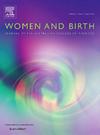From mourning to memorialising – A lasting connection through remembrance: The role of memory making in preserving the identity of parenthood amongst women who have suffered a perinatal bereavement
IF 4.1
2区 医学
Q1 NURSING
引用次数: 0
Abstract
Problem
Perinatal bereavement can severely disrupt women’s anticipated role as mothers, affecting their psychological wellbeing and identity as parents.
Background
Existing research highlights many women report persistent and enduring grief for months or even years post-loss, highlighting the urgent need for interventions to help maintain a healthy parental identity and mitigate long-term mental health impacts.
Aim
To explore how memory-making practices, supported by compassionate care, serve to preserve the parental identity of bereaved mothers after perinatal loss.
Methods
Semi-structured qualitative interviews were conducted with 54 UK-based women who had experienced a perinatal bereavement. Grounded Theory Analysis guided the inductive coding and thematic development.
Findings
Five themes emerged: (1) Compassion to Care; (2) Finding Comfort in Guidance; (3) Deriving Hope from Parental Identity; (4) Altruism as Catharsis; and (5) Comforted and Consoled. Together, these themes gave rise to the final theory, ‘From Mourning to Memorialising – A Lasting Connection through Remembrance,’ demonstrating how memory-making enables bereaved mothers to preserve their sense of parenthood after loss.
Discussion
Memory-making activities allow bereaved mothers to acknowledge their baby’s existence and uphold their parental identity. When supported by compassionate care and support, these activities help to integrate the baby’s memory into daily life, gradually easing acute grief. Over time, they become lasting markers which validate motherhood, foster continuity, and provide solace, ensuring that parenthood endures despite the absence of a living child.
Conclusions
Structured memory-making and compassionate care strategies can enhance parental identity retention, fostering emotional resilience and guiding more effective bereavement care provision.
从哀悼到纪念-通过记忆的持久联系:在遭受围产期丧亲之痛的妇女中,记忆在保持父母身份方面的作用
问题围产期丧亲会严重破坏妇女作为母亲的预期角色,影响她们的心理健康和作为父母的身份。现有的研究强调,许多女性在失去亲人后持续数月甚至数年的悲伤,强调迫切需要干预措施,以帮助维持健康的父母身份,减轻长期的心理健康影响。目的探讨在关爱的支持下,如何通过记忆实践来保护围产期丧亲母亲的父母身份。方法采用半结构化的定性访谈方法,对54名在英国经历过围产期丧亲的妇女进行访谈。扎根理论分析指导归纳编码和专题开发。五大主题:(1)从同情到关怀;(2)在引导中寻找安慰;(3)从父母身份中获得希望;(4)利他主义是一种宣泄;(5)安慰和安慰。总之,这些主题产生了最后的理论,“从哀悼到纪念——通过纪念建立持久的联系”,展示了制造记忆如何使失去亲人的母亲在失去亲人后保持父母的感觉。讨论制造记忆的活动让失去亲人的母亲承认自己孩子的存在,并维护自己父母的身份。在富有同情心的关怀和支持下,这些活动有助于将婴儿的记忆融入日常生活,逐渐缓解急性悲伤。随着时间的推移,它们成为持久的标志,证明了母亲的身份,促进了连续性,并提供了安慰,确保了父母的身份在没有活着的孩子的情况下仍然存在。结论结构化记忆制造和体恤关怀策略可以增强父母身份保留,培养情绪弹性,指导更有效的丧亲关怀提供。
本文章由计算机程序翻译,如有差异,请以英文原文为准。
求助全文
约1分钟内获得全文
求助全文
来源期刊

Women and Birth
NURSING-OBSTETRICS & GYNECOLOGY
CiteScore
7.20
自引率
13.20%
发文量
371
审稿时长
27 days
期刊介绍:
Women and Birth is the official journal of the Australian College of Midwives (ACM). It is a midwifery journal that publishes on all matters that affect women and birth, from pre-conceptual counselling, through pregnancy, birth, and the first six weeks postnatal. All papers accepted will draw from and contribute to the relevant contemporary research, policy and/or theoretical literature. We seek research papers, quality assurances papers (with ethical approval) discussion papers, clinical practice papers, case studies and original literature reviews.
Our women-centred focus is inclusive of the family, fetus and newborn, both well and sick, and covers both healthy and complex pregnancies and births. The journal seeks papers that take a woman-centred focus on maternity services, epidemiology, primary health care, reproductive psycho/physiology, midwifery practice, theory, research, education, management and leadership. We also seek relevant papers on maternal mental health and neonatal well-being, natural and complementary therapies, local, national and international policy, management, politics, economics and societal and cultural issues as they affect childbearing women and their families. Topics may include, where appropriate, neonatal care, child and family health, women’s health, related to pregnancy, birth and the postpartum, including lactation. Interprofessional papers relevant to midwifery are welcome. Articles are double blind peer-reviewed, primarily by experts in the field of the submitted work.
 求助内容:
求助内容: 应助结果提醒方式:
应助结果提醒方式:


